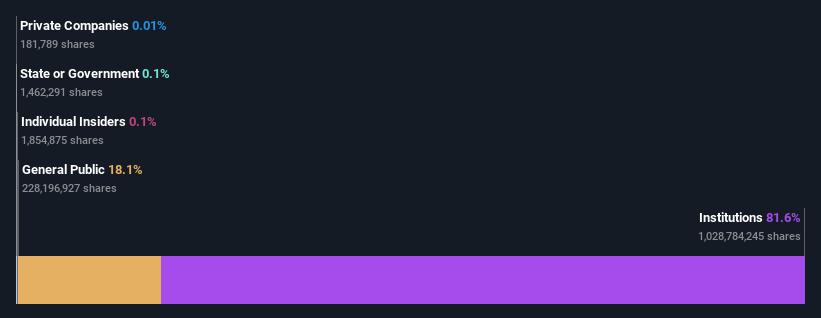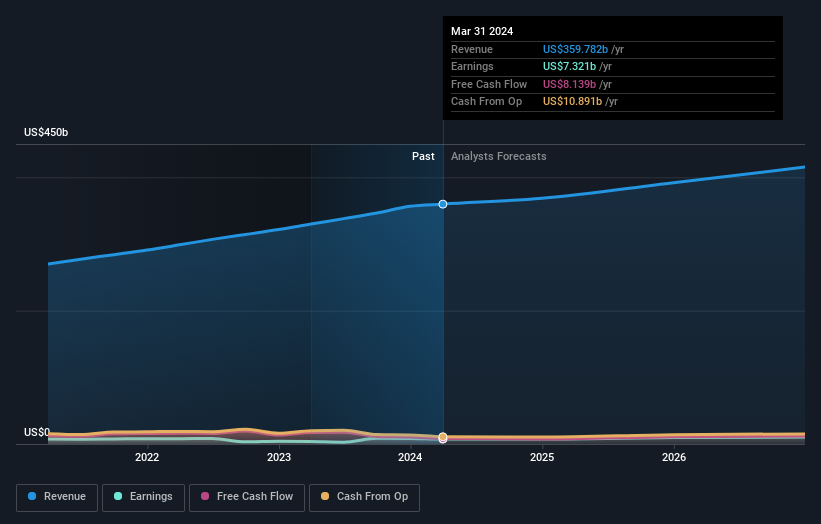Stock Analysis
- United States
- /
- Healthcare Services
- /
- NYSE:CVS
CVS Health Corporation's (NYSE:CVS) latest 17% decline adds to one-year losses, institutional investors may consider drastic measures

Key Insights
- Significantly high institutional ownership implies CVS Health's stock price is sensitive to their trading actions
- A total of 25 investors have a majority stake in the company with 50% ownership
- Recent sales by insiders
To get a sense of who is truly in control of CVS Health Corporation (NYSE:CVS), it is important to understand the ownership structure of the business. And the group that holds the biggest piece of the pie are institutions with 82% ownership. Put another way, the group faces the maximum upside potential (or downside risk).
And institutional investors saw their holdings value drop by 17% last week. This set of investors may especially be concerned about the current loss, which adds to a one-year loss of 17% for shareholders. Often called “market movers", institutions wield significant power in influencing the price dynamics of any stock. As a result, if the decline continues, institutional investors may be pressured to sell CVS Health which might hurt individual investors.
Let's delve deeper into each type of owner of CVS Health, beginning with the chart below.
View our latest analysis for CVS Health

What Does The Institutional Ownership Tell Us About CVS Health?
Institutional investors commonly compare their own returns to the returns of a commonly followed index. So they generally do consider buying larger companies that are included in the relevant benchmark index.
CVS Health already has institutions on the share registry. Indeed, they own a respectable stake in the company. This can indicate that the company has a certain degree of credibility in the investment community. However, it is best to be wary of relying on the supposed validation that comes with institutional investors. They too, get it wrong sometimes. When multiple institutions own a stock, there's always a risk that they are in a 'crowded trade'. When such a trade goes wrong, multiple parties may compete to sell stock fast. This risk is higher in a company without a history of growth. You can see CVS Health's historic earnings and revenue below, but keep in mind there's always more to the story.

Institutional investors own over 50% of the company, so together than can probably strongly influence board decisions. We note that hedge funds don't have a meaningful investment in CVS Health. The Vanguard Group, Inc. is currently the largest shareholder, with 9.3% of shares outstanding. The second and third largest shareholders are Capital Research and Management Company and BlackRock, Inc., with an equal amount of shares to their name at 7.0%.
Our studies suggest that the top 25 shareholders collectively control less than half of the company's shares, meaning that the company's shares are widely disseminated and there is no dominant shareholder.
While studying institutional ownership for a company can add value to your research, it is also a good practice to research analyst recommendations to get a deeper understand of a stock's expected performance. There are a reasonable number of analysts covering the stock, so it might be useful to find out their aggregate view on the future.
Insider Ownership Of CVS Health
The definition of company insiders can be subjective and does vary between jurisdictions. Our data reflects individual insiders, capturing board members at the very least. Company management run the business, but the CEO will answer to the board, even if he or she is a member of it.
Most consider insider ownership a positive because it can indicate the board is well aligned with other shareholders. However, on some occasions too much power is concentrated within this group.
Our information suggests that CVS Health Corporation insiders own under 1% of the company. It is a very large company, so it would be surprising to see insiders own a large proportion of the company. Though their holding amounts to less than 1%, we can see that board members collectively own US$126m worth of shares (at current prices). Arguably recent buying and selling is just as important to consider. You can click here to see if insiders have been buying or selling.
General Public Ownership
The general public, who are usually individual investors, hold a 18% stake in CVS Health. While this size of ownership may not be enough to sway a policy decision in their favour, they can still make a collective impact on company policies.
Next Steps:
It's always worth thinking about the different groups who own shares in a company. But to understand CVS Health better, we need to consider many other factors. Like risks, for instance. Every company has them, and we've spotted 2 warning signs for CVS Health (of which 1 makes us a bit uncomfortable!) you should know about.
But ultimately it is the future, not the past, that will determine how well the owners of this business will do. Therefore we think it advisable to take a look at this free report showing whether analysts are predicting a brighter future.
NB: Figures in this article are calculated using data from the last twelve months, which refer to the 12-month period ending on the last date of the month the financial statement is dated. This may not be consistent with full year annual report figures.
Valuation is complex, but we're helping make it simple.
Find out whether CVS Health is potentially over or undervalued by checking out our comprehensive analysis, which includes fair value estimates, risks and warnings, dividends, insider transactions and financial health.
View the Free AnalysisHave feedback on this article? Concerned about the content? Get in touch with us directly. Alternatively, email editorial-team (at) simplywallst.com.
This article by Simply Wall St is general in nature. We provide commentary based on historical data and analyst forecasts only using an unbiased methodology and our articles are not intended to be financial advice. It does not constitute a recommendation to buy or sell any stock, and does not take account of your objectives, or your financial situation. We aim to bring you long-term focused analysis driven by fundamental data. Note that our analysis may not factor in the latest price-sensitive company announcements or qualitative material. Simply Wall St has no position in any stocks mentioned.
About NYSE:CVS
6 star dividend payer and undervalued.

